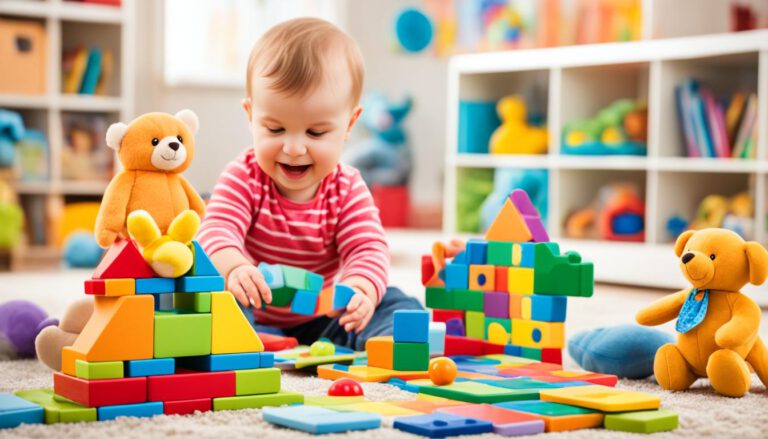What kind of toys shape children’s development?
When it comes to choosing toys for your child, it is important to consider how they can shape their development in various areas. Toys have a significant influence on a child’s cognitive, social-emotional, physical, language, fine motor skills, problem-solving skills, and creativity.
Experts suggest that the right toys can target motor skills, play skills, and cognitive skills, making them beneficial for your child’s development.
Key Takeaways:
- Choose toys that stimulate your child’s senses and promote tummy time for babies aged 0-6 months.
- Encourage exploration and cause-and-effect toys for infants aged 6-12 months.
- Enhance body awareness and pretend play with toys for children aged 1-2 years.
- Promote following directions, sharing, and interaction with peers through toys for children aged 3-5 years.
How Toys Influence Cognitive Development in Children
Cognitive development is essential for children, and toys play a significant role in shaping their cognitive skills. Toys that promote problem-solving, critical thinking, and logical reasoning can enhance cognitive development in children. For infants, toys with contrasting colors and different textures can stimulate their visual and sensory perception. As children grow older, toys like puzzles, building blocks, and board games can challenge their thinking and problem-solving abilities. Musical instruments and art supplies can also promote creativity and cognitive development. By providing children with toys that require mental engagement and stimulate their curiosity, parents and caregivers can support their cognitive growth.
Children’s cognitive skills are crucial for their overall brain development. Engaging toys can help children develop their problem-solving skills, critical thinking abilities, and logical reasoning. By interacting with toys that encourage them to explore, experiment, and analyze, children can strengthen their cognitive capabilities and expand their understanding of the world around them.
For infants, toys that offer contrasting colors and different textures can stimulate their visual and sensory perception. These toys help babies develop their cognitive skills by promoting visual tracking, hand-eye coordination, and sensory exploration. Examples of such toys include rattles, textured balls, and toys with mirrors. These toys engage infants’ attention and curiosity, facilitating the development of their cognitive abilities.
As children grow older, their cognitive abilities become more advanced, and toys can cater to their evolving needs. Puzzles, building blocks, and construction sets are excellent toys for promoting cognitive development in children. These toys encourage problem-solving skills, spatial reasoning, and logical thinking. The process of solving puzzles or building structures requires children to think critically and use trial-and-error approaches, enhancing their cognitive skills.
Board games are another valuable tool for fostering cognitive development in children. Games that involve strategy, decision-making, and problem-solving can enhance children’s cognitive abilities. These games require players to analyze different scenarios, make logical choices, and anticipate outcomes. By engaging in strategic gameplay, children develop their planning, reasoning, and problem-solving skills.
Benefits of Toys for Cognitive Development:
- Stimulates problem-solving skills and critical thinking
- Enhances logical reasoning and decision-making abilities
- Promotes spatial awareness and visual-spatial skills
- Fosters creativity and imaginative thinking
- Boosts memory and cognitive flexibility
| Age Range | Recommended Toys for Cognitive Development |
|---|---|
| Infants (0-6 months) | Toys with contrasting colors and different textures |
| 6-12 months | Exploration and cause-and-effect toys |
| 1-2 years | Toys that enhance body awareness and pretend play |
| 3-5 years | Toys that promote following directions, sharing, and interaction with peers |
By providing children with toys that stimulate their cognitive skills, parents and caregivers can play a vital role in their overall development. Choosing age-appropriate toys that foster problem-solving, critical thinking, and logical reasoning can have a long-lasting impact on children’s cognitive abilities.
The Impact of Toys on Social-Emotional Development
Toys play a crucial role in the social-emotional development of children. By engaging in imaginative play and role-playing, children can develop essential social skills, empathy, and emotional intelligence. Dolls, puppets, and toy animals provide children with a platform to express their emotions and practice social interactions, fostering the development of crucial interpersonal skills.
Building sets and pretend play toys enable children to engage in cooperative play, allowing them to understand the importance of teamwork and develop effective communication skills. Furthermore, books with relatable characters and stories can serve as valuable tools for facilitating discussions on emotions and social situations. These enriching experiences help children navigate relationships, comprehend emotions, and acquire vital social skills.
By providing children with toys that promote social-emotional development, parents and caregivers can support the healthy growth of their emotional intelligence, social skills, and communication skills. Encouraging the use of such toys can contribute to the holistic development of children, equipping them with the necessary tools to thrive in various social contexts.
FAQ
What kind of toys shape children’s development?
Toys that promote cognitive development, social-emotional development, physical development, language development, fine motor skills, problem-solving skills, and creativity can shape children’s development.
How do toys influence cognitive development in children?
Toys that promote problem-solving, critical thinking, logical reasoning, and mental engagement can enhance cognitive development in children. Examples include puzzles, building blocks, board games, and art supplies.
What is the impact of toys on social-emotional development?
Toys that encourage imaginative play, role-playing, and cooperative play can enhance social skills, empathy, emotional intelligence, and communication skills in children. Examples include dolls, puppets, toy animals, and building sets.


Leave a comment